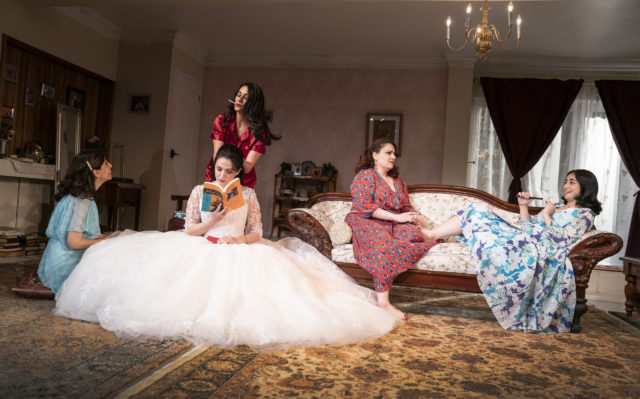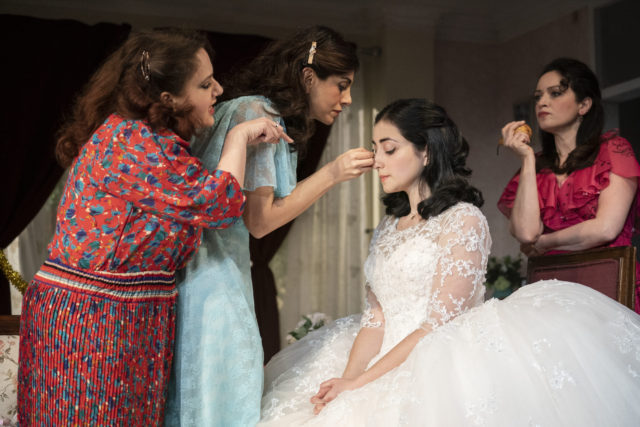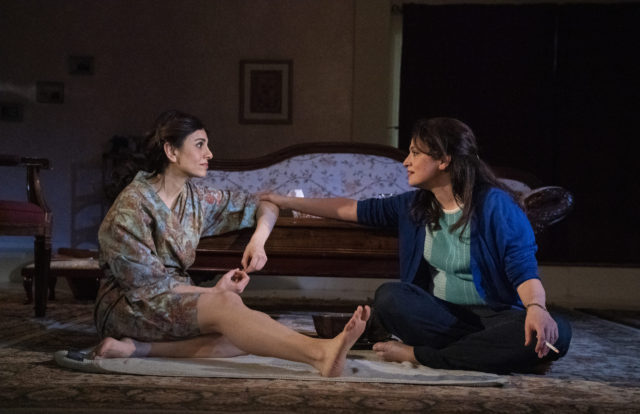
Five friends get ready for a wedding in world premiere of Sanaz Toossi’s Wish You Were Here at Playwrights Horizons (photo by Joan Marcus)
WISH YOU WERE HERE
Playwrights Horizons, Mainstage Theater
416 West 42nd St. between Ninth & Tenth Aves.
Tuesday – Sunday through June 5, $49-$89
www.playwrightshorizons.org
First-generation Iranian-American playwright Sanaz Toossi follows up her wonderful professional debut, English, which ran earlier this year at the Atlantic, with the even better Wish You Were Here, which opened tonight at Playwrights Horizons.
Written in 2018 as her NYU thesis in response to Donald Trump’s Muslim travel ban and anti-immigration policies, English is set in a TOEFL classroom in Karaj, Iran, in 2008, where four Iranian adults are learning to speak English as they and their teacher question the meaning of home and how language and culture impact their identity.
Written in 2019 as a response to Trump’s threat to retaliate against Iran after the Western Asian republic shot down an unmanned US drone, Wish You Were Here follows the trials and tribulations of five close female friends in Karaj from 1978 to 1991 who experience what Toossi calls “detached homesickness” as the nation goes through major changes, from the Islamic Revolution to the Iran-Iraq War.
The story unfolds in ten scenes that all take place in the same well-accoutred living room. Salme (Roxanna Hope Radja) is in a giant wedding gown, getting ready for her special day. Shideh (Artemis Pebdani) is giving Zari (Nikki Massoud) a pedicure, announcing so everyone can hear, “Your toes are disgusting.” (There are a lot of bare feet throughout the play.) Nazanin (Marjan Neshat) makes adjustments to the dress while flirting with Rana (Nazanin Nour), who is très elegant in her shiny silk pajamas, smoking a cigarette as she does Salme’s hair.
As they continue to primp, they regale one another with a string of hysterical dirty jokes and good-natured insults. “I’m steaming out of my dress, Shideh,” Nazanin says, referring to her nether regions. “Ew,” Shideh replies. “My pussy could iron a shirt,” Nazanin adds. Rana asks, “Oh what kind of shirt?”

Shideh (Artemis Pebdani) has a lot to say as Nazanin (Marjan Neshat) applies makeup to Zari (Nikki Massoud) and Salme (Roxanna Hope Radja) hovers behind them (photo by Joan Marcus)
“If a man saw her toes, I think his penis would fall off,” Shideh says about Zari. Rana admits, “Silk does not breathe well. Whatever you’re smelling is me and I don’t want to talk about it.” And Zari advises Salme what to do when encountering a man’s member: “When you first see one, smile. Smile so big. Smile bigger than you’ve ever smiled in your life. Like you need to swallow a plate.”
It’s an enchanting scene in which we fall in love with the characters while learning key facts about each of them: Shideh is studying to be a doctor and is considering going to school in America; Salme is the most religious one, regularly praying, believing that you “can’t jinx G-d’s will”; the easygoing Zari is in the market for a husband; and the ultracool Rana and the occasionally mean Nazanin plan to avoid marriage and children, although Nazanin lets it be known that she wants to eventually return to Iran after living it up in Miami. (Coincidentally, in English, Neshat plays a teacher who made a life for her and her family in London but came back to Karaj, perhaps regretting that decision.)
A year later it is Zari who is getting married, but a pall is cast over the proceedings when Shideh mentions Rana’s name; Rana, who is Jewish, has gone missing, along with her parents and brother. Salme is trying to find her, but Nazanin says, as if trying to convince herself, “If she wanted to vanish into thin air, with no trace, no word, without shit, then that’s how she wanted to do it.”

Nazanin (Marjan Neshat) and Salme (Roxanna Hope Radja) cement a bond in Wish You Were Here (photo by Joan Marcus)
But as we soon discover, Nazanin has a problem with people leaving, whether it’s a friend moving away with a new husband, another friend going off to study abroad, or a best friend disappearing in a country becoming ever-more dangerous. As many Iranians choose to escape their homeland because of war and an oppressive regime, Nazanin feels stuck, resenting those who attempt to make a new life for themselves and their family instead of getting out while she still can. It’s a bitter pill, especially when seen in retrospect. “Why don’t I want to leave?” she wonders. It’s a question people ask themselves every day across the globe.
Wish You Were Here is directed by Gaye Taylor Upchurch (Animal, The Year of Magical Thinking) with a warm and welcoming intimacy that invites us into these women’s complex lives with, as the characters often say, “no judging.” The comforting set is by Arnulfo Maldonado, with handsome costumes by Sarah Laux, subtle lighting by Reza Behjat, and meticulous sound by Sinan Refik Zafar and Brian Hickey.
The hundred-minute play was also written by Toossi as a love letter to her mother and her mother’s friends, immigrants who started all over in the United States; parts of the story are based on real experiences. Toossi, who was born and raised in Orange County, California, and is now based in Brooklyn, has beautifully depicted the ups and downs, the sheer joys and the petty jealousies, that define female friendship.
Over the course of thirteen years, Iran underwent tremendous change, but Toossi does not focus so much on world events as on how they impact the women’s relationships with each other; the scenes involving only two of the women at a time are particularly emotional and heart-wrenching as Toossi explores the many layers of attachment, mere cordiality, and sincere love the women share. While Salme is afraid of pulling off the tape when Nazanin is waxing her legs for fear of hurting her physically, Zari is not afraid to tell Nazanin, “You have a way of making me feel really lonely.”
The cast is exceptional; it truly does seem like you’re watching five friends go about their daily existence, dealing with love and loss as they dance wildly to a song on the radio, hide under a table during a bombing, kneel down to pray to Mecca, or deliver yet another pussy joke. In between scenes, the actors make minor changes to the living room to indicate a shift in location, moving around tables or opening the curtain in the back to reveal a bright garden. It’s as if the five actors, and the audience, need a short break from the intensity of the play while getting ready to see what the next year holds in store for everyone. I can’t wait to see what Toossi has in store for all of us next.